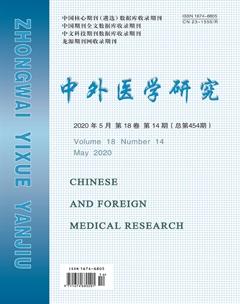腹腔镜胃癌根治术对患者术后并发症及血清学指标的影响
陈剑明 涂锴 陈国平 陈榕

【摘要】 目的:探析腹腔镜根治术对胃癌患者术后并发症和血清学指标影响。方法:将2015年2月-2019年10月在笔者所在医院肿瘤外科行根治术治疗的103例胃癌患者纳入观察中,依照患者手术意愿分成研究组和常规组,分别为55、48例;常规组采取开腹根治术,研究组行腹腔镜根治术,对比两组淋巴结清除情况,测定术后血清学指标和术后并发症发生率。结果:研究组淋巴结清扫数显著高于常规组(P<0.05)。研究组术前血清CRP、TNF-α及IL-6与常规组比较差异无统计学意义(P>0.05),术后1 d研究组均低于常规组(P<0.05)。研究组术后并发症发生率为10.91%,常规组为27.08%,差异有统计学意义(P<0.05)。结论:腹腔镜胃癌根治术的淋巴结清扫效果显著优于常规开腹术,且术后并发症少,能有效减少机体应激反应。
【关键词】 腹腔镜胃癌根治术 胃癌 并发症 血清学指标
[Abstract] Objective: To explore the influence of laparoscopic gastrectomy on postoperative complications and serological indexes of gastric cancer patients. Method: From February 2015 to October 2019, 103 patients with gastric cancer who underwent radical resection in tumor surgery department of our hospital were included in the observation. According to the surgical intention of the patients, they were divided into the study group and the conventional group (55 cases and 48 cases respectively). The conventional group underwent laparotomy and the research group underwent laparoscopic gastrectomy. The lymph node clearance in the two groups was compared, and the postoperative serological indicators and postoperative complication rate were measured. Result: The number of lymphadenectomy in the study group was significantly higher than that in the routine group (P<0.05). The levels of CRP, TNF-α and IL-6 in the two groups before operation was no significant difference (P>0.05), 1 d after operation, the levels of CRP, TNF-α and IL-6 in the study group were lower than those in the control group (P<0.05). The incidence of postoperative complications was 10.91% in the study group and 27.08% in the routine group, there was significant difference in two groups (P<0.05). Conclusion: The effect of lymphadenectomy in laparoscopic gastrectomy is better than that in conventional laparotomy, and the postoperative complications are less, which can effectively reduce the bodys stress response.
胃癌是临床常见的一种消化系统恶性肿瘤,发病率和死亡率均较高。当前,临床以根治术治疗为主,能有效延长患者生存期[1]。开腹术和腹腔镜微创术是胃癌主要的手术方式,各具优缺点,前者视野清晰、病灶清除率高,且有利于术中扩大清扫范围,但创伤大、术中出血较多;后者创伤小、术后恢复快,但视野相对小,手术操作要求更高。但不管是哪种术式均存在显著创伤、术后恢复周期长,会引起患者机体应激反应。研究报道,胃癌手术情况和血清应激性炎性介质表达存在相关性[2]。基于此,本文对103例胃癌患者根治术治疗进行研究,分析腹腔镜根治术和开放根治术对患者术后并发症和血清学指标的影响,现报告如下。
1 资料与方法
1.1 一般资料
以笔者所在医院肿瘤外科2015年2月-2019年10月接治的103例原发性胃癌患者作为研究对象,均经症状、细胞学、病理学等检查确诊,符合文献[3]《胃癌诊疗规范(2018年版)》有关诊断标准。纳入标准:(1)确诊为原发性胃癌,TNM分期Ⅰ~Ⅲ期;(2)初治患者,生存期>6个月;(3)ASA分级Ⅰ~Ⅱ级,满足手术适应证;(4)患者及其家属对手术方式知情并签署知情同意书。排除标准:(1)轉移性胃癌;(2)合并其他癌症;(3)心、肺、肝、肾功能不全,伴免疫系疾病、血液系疾病;(4)化疗、免疫治疗史。本研究通过医院伦理委员会的批准。根据患者手术意愿分成两组。其中,常规组:48例,男女患者分别为26、22例;年龄41~72岁,平均(58.2±4.4)岁;TNM分期:Ⅰ期6例,Ⅱ期17例,Ⅲ期25例。研究组:55例,男女患者分别为31、24例;年龄45~71岁,平均(57.7±4.6)岁;TNM分期:Ⅰ期5例,Ⅱ期19例,Ⅲ期31例。两组患者临床基本情况差异无统计学意义(P>0.05),具可比性。

